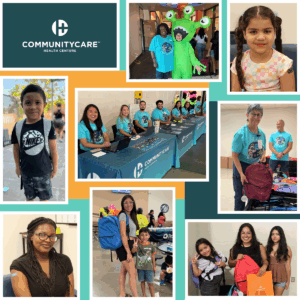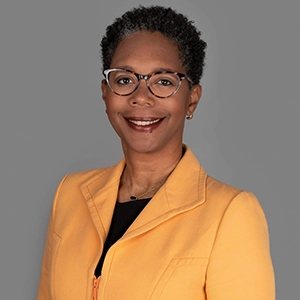A Farewell: CommUnityCare Health Centers Board Member Barbara Brooks-Robinson Reflects on 16 Years of Service

As my time of service on the Board of Directors of CommUnityCare Health Centers comes to a close, I reflect with deep gratitude, humility, and pride on this extraordinary journey.
I first became a patient in 2008 and then joined the CommUnityCare Health Centers Board of Directors in 2010. My relationship with this organization began at one of the most vulnerable moments of my life. After suffering from a heart attack in 2008, I became unemployed and lost my health insurance. Accessing the care I needed felt overwhelming and uncertain, until a social worker introduced me to CommUnityCare.
Through CommUnityCare Health Centers, I received not only treatment for my heart condition, but care for multiple pre-existing conditions, access to specialty services, and timely, compassionate follow-up. I am also a 46-year cancer “thriver.” I use that word intentionally; survivors live in the wilderness, but thrivers live in the promised land. By the grace of God and through the care I have received over the years at CommUnityCare Health Centers, I continue to thrive. Ongoing monitoring and early detection have been life-giving, and I remain deeply grateful to the physicians and care teams who have walked alongside me.
I was recommended to the board of directors by a triage nurse, an invitation that changed the course of my life. What many may not realize is that Federally Qualified Health Centers are required to maintain a patient majority of 51% on their boards. One of our most important responsibilities as the board of directors is to identify gaps in care for underserved communities and to partner with leadership to ensure those needs are met. Serving as a patient board member has been both a responsibility and an honor.
One of my proudest accomplishments during my 16 years of service was the creation of the Patient Experience Committee, a space where patient-centered board members could elevate concerns, share lived experience, and also celebrate successes. Throughout my tenure, I served on many committees and conclude my service as Chair of the Nomination and Governance Committee. I take pride in knowing that my leadership helped shape bylaws, policies, and procedures that continue to guide this board today, and that many current directors came through this governance process.

Advocacy has also been central to my service. Over the years, I have traveled frequently to Washington, D.C., and to the Texas State Capitol to advocate for funding for Federally Qualified Health Centers and to raise awareness about the growing mental health crisis. These efforts were always rooted in the belief that access to quality health care is not a privilege; it is a necessity.
When I joined the board of directors, CommUnityCare Health Centers operated around 21 sites. Today, the organization has grown to more than 30 sites. Witnessing this growth, and the ongoing efforts to realign clinical assets to meet the changing demographics and needs of Travis County, has been incredibly rewarding.
Beyond my board service, I have served as a prison minister for more than 21 years. I often say that I was saved to serve. Many of the women I minister live with a mental illness, chronic conditions, and significant barriers to care. My involvement with CommUnityCare Health Centers has equipped me with the knowledge to help individuals navigate the system, qualify for services, and access the care they desperately need, especially those reentering the community after incarceration.
As I continue to evolve into my purpose, I remain profoundly thankful to CommUnityCare Health Centers and Central Health for the opportunity to serve. I serve so that others may feast from the same table I did when I was in need. CommUnityCare Health Centers is, and will always be, my health care of choice.
I leave this role personally blessed, deeply fulfilled, and committed to continuing to pay it forward. Thank you for the privilege of allowing me to serve alongside such dedicated leaders, providers, and advocates for our community.
With gratitude,
Barbara Brooks-Robinson
 CommUnityCare Health Centers is proud to announce key leadership appointments as the organization continues to evolve to meet the growing and complex healthcare needs of Central Texas.
CommUnityCare Health Centers is proud to announce key leadership appointments as the organization continues to evolve to meet the growing and complex healthcare needs of Central Texas.


 By Nicholas Yagoda, MD, CEO for CommUnityCare Health Centers
By Nicholas Yagoda, MD, CEO for CommUnityCare Health Centers

 CommUnityCare Health Centers is excited to announce Cristie Pellegrini has been promoted to Chief Pharmacy Officer, where she will lead the strategic, clinical, financial, and operational oversight of the organization’s pharmacy services.
CommUnityCare Health Centers is excited to announce Cristie Pellegrini has been promoted to Chief Pharmacy Officer, where she will lead the strategic, clinical, financial, and operational oversight of the organization’s pharmacy services. Austin, TX — The CommUnityCare Board of Directors has appointed Dr. Nicholas Yagoda as permanent Chief Executive Officer (CEO), elevating him from the interim position he has held since September 2024.
Austin, TX — The CommUnityCare Board of Directors has appointed Dr. Nicholas Yagoda as permanent Chief Executive Officer (CEO), elevating him from the interim position he has held since September 2024.